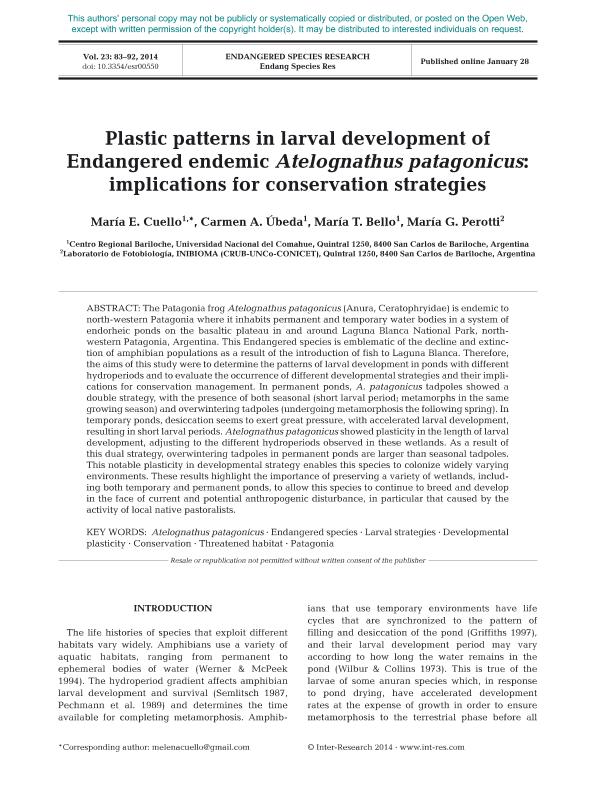Mostrar el registro sencillo del ítem
dc.contributor.author
Cuello, María E.
dc.contributor.author
Ubeda, Carmen A.
dc.contributor.author
Bello, María T.
dc.contributor.author
Perotti, Maria Gabriela

dc.date.available
2017-01-25T18:18:32Z
dc.date.issued
2014-02
dc.identifier.citation
Cuello, María E.; Ubeda, Carmen A.; Bello, María T.; Perotti, Maria Gabriela; Plastic patterns in larval development of threathened endemic Atelognathus patagonicus (Anura, Neobatrachia). Implications for conservation strategies; Inter-Research; Endangered Species Research; 23; 2-2014; 83-92
dc.identifier.issn
1863-5407
dc.identifier.uri
http://hdl.handle.net/11336/11900
dc.description.abstract
The endemic frog Atelognathus patagonicus lives in permanent and temporary water bodies in a system of endorheic ponds on the basaltic plateau in Laguna Blanca National Park and surroundings, in north-western Patagonia, Argentina. This species is an emblematic example of the decline and extinction of amphibian populations as a result of the introduction of fish. It is categorized as ?Endangered? by IUCN. The aims of the study were to determine the patterns of larval development in ponds with different hydroperiods and evaluate the occurrence of different developmental strategies and their implications for conservation management. In permanent ponds, A. patagonicus tadpoles showed a double strategy, with presence of seasonal tadpoles (short larval period; metamorphs in the same growing season) and overwintering tadpoles (tadpoles undergoing metamorphosis the following spring). In temporary ponds, desiccation seems to exert great pressure, with accelerated larval development, resulting in short larval periods. Atelognathus patagonicus showed plasticity in the length of larval development, adjusting to the different hydroperiods observed in these wetlands. As a result of this dual strategy, overwintering tadpoles in permanent ponds are larger than seasonal tadpoles. This notable plasticity in development strategies would enable it to colonize environments as widely varying as those analyzed in this study. These results highlight the importance of preserving a variety of wetlands, including both temporary and permanent ponds, to allow this species to continue to breeding and developing in the face of current and potential human disturbance, in particular, any caused by the activity of local native pastoralists.
dc.format
application/pdf
dc.language.iso
eng
dc.publisher
Inter-Research

dc.rights
info:eu-repo/semantics/openAccess
dc.rights.uri
https://creativecommons.org/licenses/by/2.5/ar/
dc.subject
Endangered Species
dc.subject
Larval Strategies
dc.subject
Developmental Plasticity
dc.subject
Conservation
dc.subject.classification
Conservación de la Biodiversidad

dc.subject.classification
Ciencias Biológicas

dc.subject.classification
CIENCIAS NATURALES Y EXACTAS

dc.title
Plastic patterns in larval development of threathened endemic Atelognathus patagonicus (Anura, Neobatrachia). Implications for conservation strategies
dc.type
info:eu-repo/semantics/article
dc.type
info:ar-repo/semantics/artículo
dc.type
info:eu-repo/semantics/publishedVersion
dc.date.updated
2016-12-12T14:21:36Z
dc.journal.volume
23
dc.journal.pagination
83-92
dc.journal.pais
Reino Unido

dc.journal.ciudad
Exeter
dc.description.fil
Fil: Cuello, María E.. Universidad Nacional del Comahue. Centro Regional Universitario Bariloche; Argentina
dc.description.fil
Fil: Ubeda, Carmen A.. Universidad Nacional del Comahue. Centro Regional Universitario Bariloche; Argentina
dc.description.fil
Fil: Bello, María T.. Universidad Nacional del Comahue. Centro Regional Universitario Bariloche; Argentina
dc.description.fil
Fil: Perotti, Maria Gabriela. Consejo Nacional de Investigaciones Científicas y Técnicas. Centro Científico Tecnológico Patagonia Norte. Instituto de Investigación En Biodiversidad y Medioambiente; Argentina. Universidad Nacional del Comahue. Centro Reg.universidad Bariloche. Laboratorio de Fotobiologia; Argentina
dc.journal.title
Endangered Species Research
dc.relation.alternativeid
info:eu-repo/semantics/altIdentifier/url/http://www.int-res.com/abstracts/esr/v23/n1/p83-92/
dc.relation.alternativeid
info:eu-repo/semantics/altIdentifier/doi/https://doi.org/10.3354/esr00550
Archivos asociados
